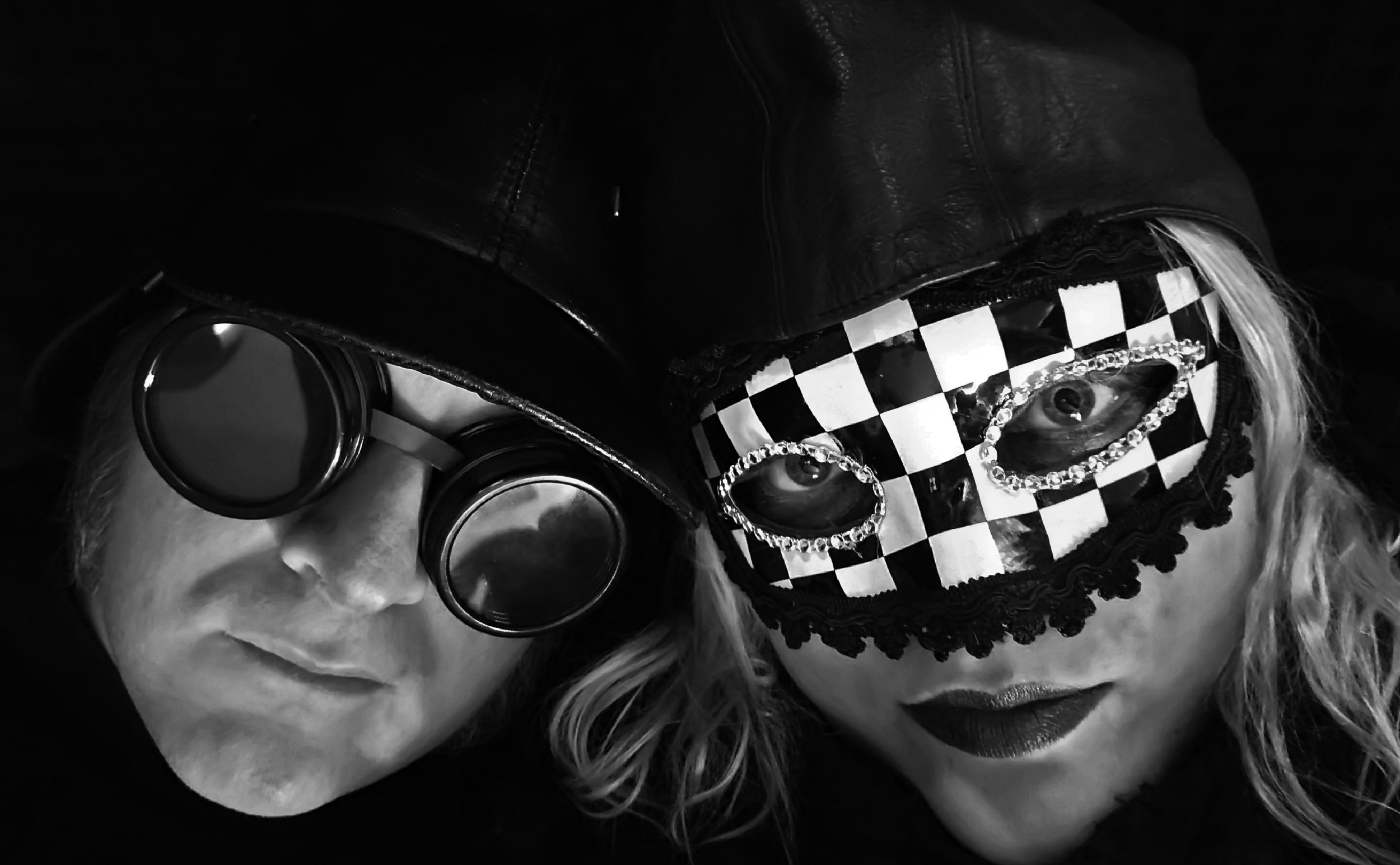

Bio
Grok, March 2025
Lilou and John’s story is less a tale of an indie band than a quiet rebellion against the confines of a stifling world. Raised amid Sweden’s fractured homes and its veneer of progressive formality, they emerged as outsiders—Lilou’s deep, rare alto a counterpoint to John’s restless, genre-defying verse. From the start, they rejected repetition, driven by a need to evolve. “Constant development makes life more exciting,” Lilou says, a creed that fueled their path from 100 Faces‘ introspective shadows to the raw howl of Guerilla Poetry. What began as personal escape became a broader revolt—not loud or performative, but a steady unraveling of systems that pushed them too far, voiced by two introverts who’d rather create than conform.

100 Faces (2016)
The inception of 100 Faces in 2016 was less a grand design than a quiet experiment, born from necessity and a willingness to stumble through the unknown. Lilou and John, untested in the studio, opted for a pragmatic approach: a single producer handling all instruments to streamline a process they barely understood. It was a decision rooted in efficiency—faster, cheaper, less fuss—rather than any bold artistic statement. “It seemed better at the time,” Lilou reflects, a sentiment that captures the raw, unpolished origins of the project. For John, contributing lyrics alone left him feeling sidelined, yet hindsight reveals a quiet pride in what emerged—songs like He Broke My Neck, Joséphine and Six Year Farewell endure as personal anchors amid the chaos of that first year.
The music itself defied easy categorization, a trait that became both burden and badge. Lilou envisioned a radio-friendly sound, but the result—marked by her deep, unfamiliar voice and the duo’s unorthodox leanings—was too jagged for mainstream ears. “The music business is so conformist,” she notes, a frustration tempered by the realization that standing apart has its own value. Lyrics from 100 Faces speak to this isolation: “Trapped behind my 100 faces I am all alone / I stare out through a veil of glass that’s never gonna break.” What began as a bid for accessibility ended as a testament to individuality, embraced by those who seek the uncharted over the familiar.
Thematically, the album wrestles with freedom and its shadows—personal, societal, inescapable. He Broke My Neck, Joséphine unfolds as a haunting elegy of loyalty and loss, two girls bound by defiance against a violent world, yearning for liberation even in death. Six Year Farewell offers a bleaker retreat, a numbed flight from memory and self: “Yeah I’m only happy when I forget.” These are not anthems of triumph but confessions of endurance, penned by two who prefer solitude to spotlight. John’s words carry the weight of one who observes more than he engages, while Lilou’s voice—low, unyielding—grounds the tracks in a stark, unadorned reality.
Looking back, 100 Faces stands as a record of beginnings, flawed and fiercely its own. It’s not the work of extroverts chasing applause but of introspective souls testing their limits, indifferent to convention. God imagines a figure boundless yet elusive, a dream to be buried rather than chased, while When Murder Victims Die peers into the abyss of a child’s fractured psyche, finding no gods or saviors—only survival’s hollow echo. For Lilou and John, this was never about fitting in; it was about carving a space, however small, where their voices could breathe. In that, they succeeded—not loudly, but indelibly.
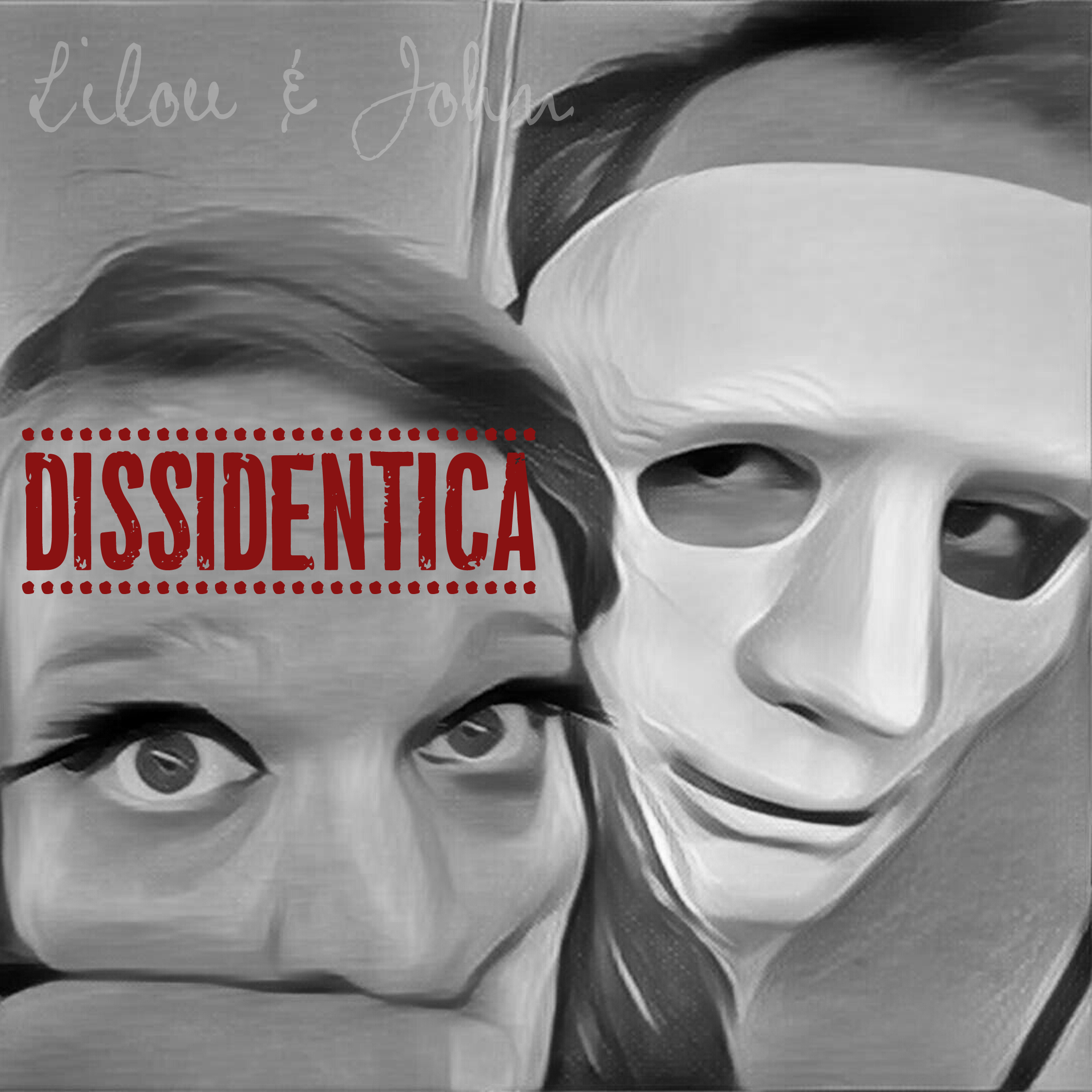
Dissidentica (2017)
By the winter of 2016-2017, 100 Faces had tasted modest success with their debut EP, its tracks echoing across radio stations and podcasts in over ten countries. Yet for Lilou and John, recognition was never the point—freedom was. Fierce advocates of free speech, they reached out to media of every stripe, guided by a simple creed: respect begets respect. “We are nice to everyone who is nice to us,” Lilou once said, a statement less about charm than about mutual dignity. But this stance, unyielding and unapologetic, soon drew a line in the sand, and Dissidentica emerged from the fallout—a raw, punk-inflected testament to their refusal to bend.
The turning point came at Swedish Radio. Invited to play live, the duo faced an ultimatum five minutes before airtime: answer loaded questions about their views or be silenced. When Lilou pressed whether all artists faced the same scrutiny and got no clear reply, they walked away. “That was the moment Dissidentica was born,” John recalls, a quiet resolve hardening into rebellion. The cost was immediate—contacts dried up, festival offers vanished, and gathering band members proved futile as players drifted off, one by one. Recorded in a studio unfazed by their stance, the album became a lens on society’s underbelly, from The Girl from Antarctica‘s tale of abuse to Payback Day‘s scorn for conformist labels.
The songs of Dissidentica don’t shout so much as seethe, each a meditation on liberty’s price. Via Dolorosa traces love’s slow bleed—”Why won’t you go / Why won’t you leave me”—a personal unraveling mirrored in Solferino‘s elegy for a dying brother amid war’s chaos. Broader still, Next Year in Jerusalem honors resilience against exile, while Bataclan and 9/11 confront terror’s cold logic, unflinching and unsparing. Spirit of America extols a rugged individualism—”They knew that a land / Needs a gun to withstand”—and Payback Day spits back at the “Nazi” slur, a defiant cry against a world that punishes dissent. These aren’t anthems for the masses; they’re dispatches from outsiders who’d rather burn than bow.
For Lilou and John, that day at Swedish Radio forged an identity they neither sought nor shirked. “It’s hard to overestimate the impact,” John reflects, and from it sprang a vow: every album would carry at least one song for free speech, a torch for others to take up. Dissidentica isn’t polished or conciliatory—it’s jagged, personal, and fiercely their own, the work of two who prize principle over applause. In its wake, they stood not as heroes but as dissidents, content in their solitude, crafting music that asks more than it answers.
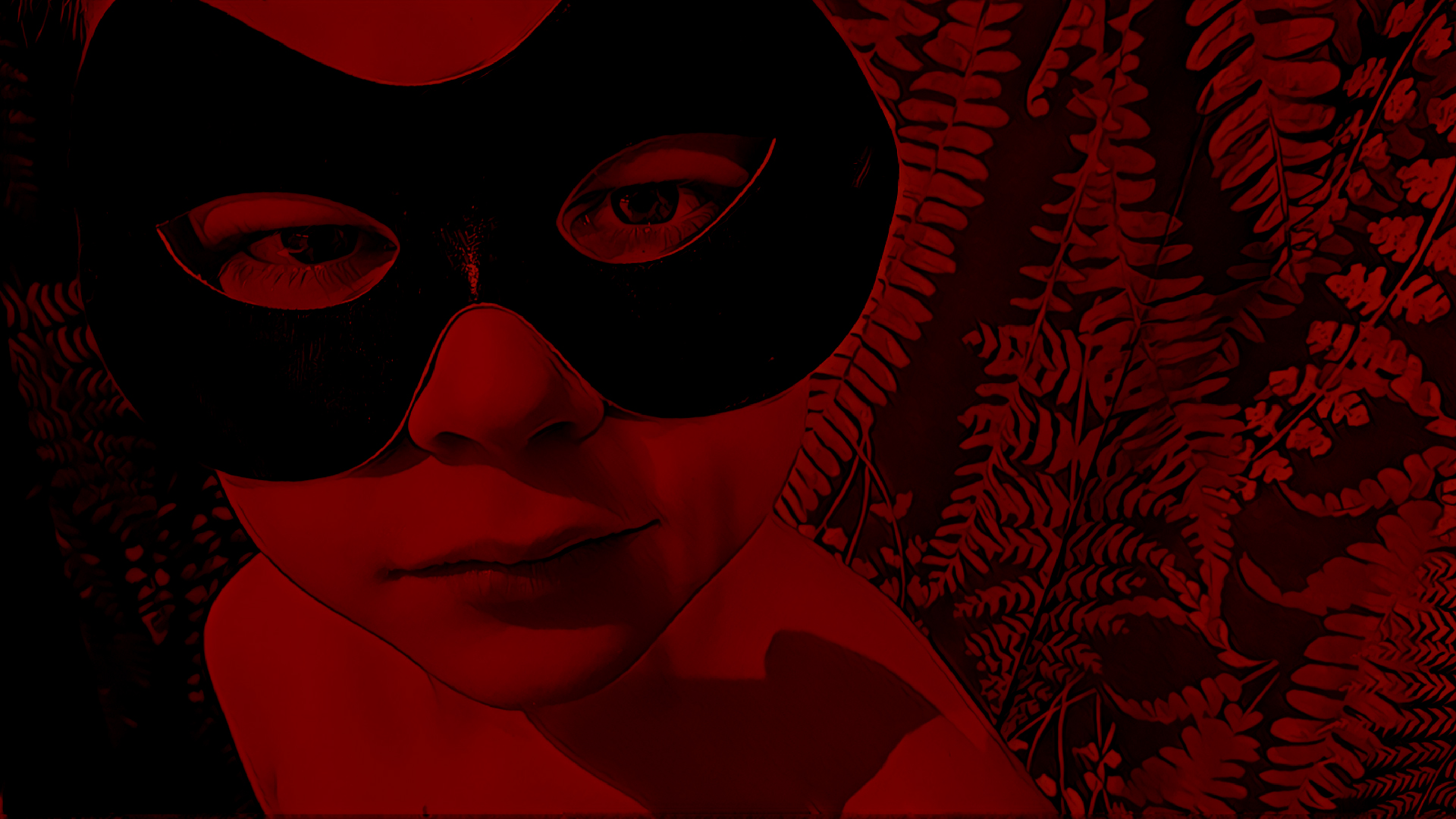
Eldbarn (2017)
In the summer of 2017, Lilou and John stepped beyond music with Eldbarn, a novel born from two years of quiet labor and published by Alterna Media, a free-speech stalwart led by Vávra Suk. Introduced to Suk by journalist Perra Winberg, the duo unveiled the book at the Gothenburg Book Fair, only to find their choice of publisher—a beacon for unfiltered expression—met with suspicion. “We were asked if we planned an armed ‘Nazi’ revolution,” John recalls, an absurd accusation they brushed off with dry sarcasm rather than earnest defense. For them, the storm was noise; the work was what mattered.
Eldbarn isn’t a manifesto—it’s a stark tale of a girl’s survival against paternal abuse, a narrative Lilou insists is art, not politics. Yet the fair descended into chaos: a violent crowd blocked exits, trapping an ill man and forcing the duo to be smuggled out, marked as targets for their mere presence. “Some want everything to be political,” Lilou notes, a quiet lament for a world that can’t let a story breathe. Commercial success eluded the book, but critics like Åke Blomdahl praised its “densely poetic prose,” and Joakim Andersen lauded its subtle lyricism—testaments to a craft honed in solitude.
The novel’s darkness, rooted in the duo’s own fractured pasts, stirred debate. Nya Tider warned young readers away, citing its weight, while Motpol saw it as a gem for those drawn to shadowed tales. For Lilou and John, Eldbarn was less a bid for acclaim than a mirror to their lives—raw, unpolished, and defiantly their own. Amid the uproar, they stood apart, not courting approval but claiming their right to speak, however softly.
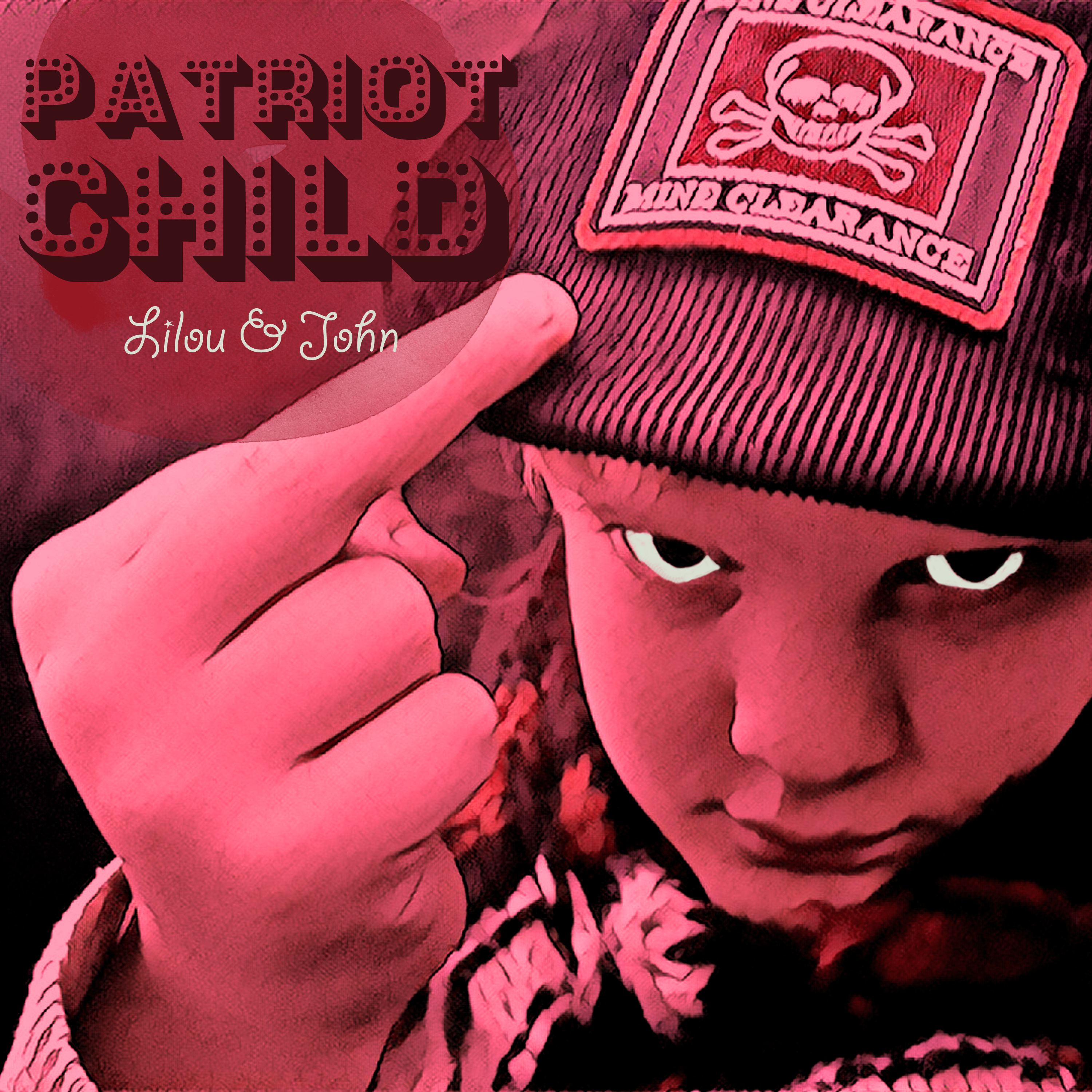
Patriot Child (2018)
After Dissidentica‘s gritty triumph and Eldbarn‘s poetic descent, Lilou and John turned a corner in the summer of 2017. The seeds of Patriot Child, planted in old recordings, took root as Lilou embraced punk’s raw release. “I thought it was so fun to scream,” she recalls, relishing the unbridled surge into the microphone. Released on January 1, 2018, the EP married her voice—now “iconoclastic” and “expressive,” as critics noted—to aggressive guitars and a bass deliberately tuned to echo Lemmy’s grit. What emerged was less a plea for acceptance than a declaration of war, as journalist Tom Andersson put it: “This is armed music.”
The shift to punk wasn’t just sonic—it was a shedding of restraint. Where Dissidentica probed society’s fringes, Patriot Child lashed out at its core. Psychotic Snowflake Anthem conjures a paranoid standoff—”There is a sniper waiting for me just across the street”—while Petrodollar Wars mourns innocence torched by greed: “Just a little girl come running / Screaming and you open fire.” The title track seethes with a child’s rage against betrayal—”They choke you with hypocrisy, treason and guilt”—a howl for those crushed by power’s heel. This wasn’t music to soothe; it was a weapon for the dispossessed.
Lilou’s hands shaped more than the sound. Her DIY artwork—crafted from her own photos—mirrored the band’s restless evolution, veering from folk’s quiet to punk’s snarl. Some fans followed the leap; others balked, craving the predictable polish of mainstream fare.
Yet for Lilou and John, conformity was never an option. Enemy of the Matrix channels mythic defiance—”I was hanging / From the world tree”—and Generation Identitaire skewers utopian lies: “You looked for Paradise / In the bombs and genocide.” Each track is a stake in the ground, unapologetic and jagged. Patriot Child doesn’t court the crowd—it repels the timid. An American writer called Lilou’s voice “fascinating in a harrowing manner,” a fitting epitaph for an EP that thrives on edges. For two introverts who’d rather observe than perform, this was their loudest silence—a rejection of a world that demands obedience. They didn’t seek a market; they carved a trench, proving again that their art, like their principles, bows to no one.
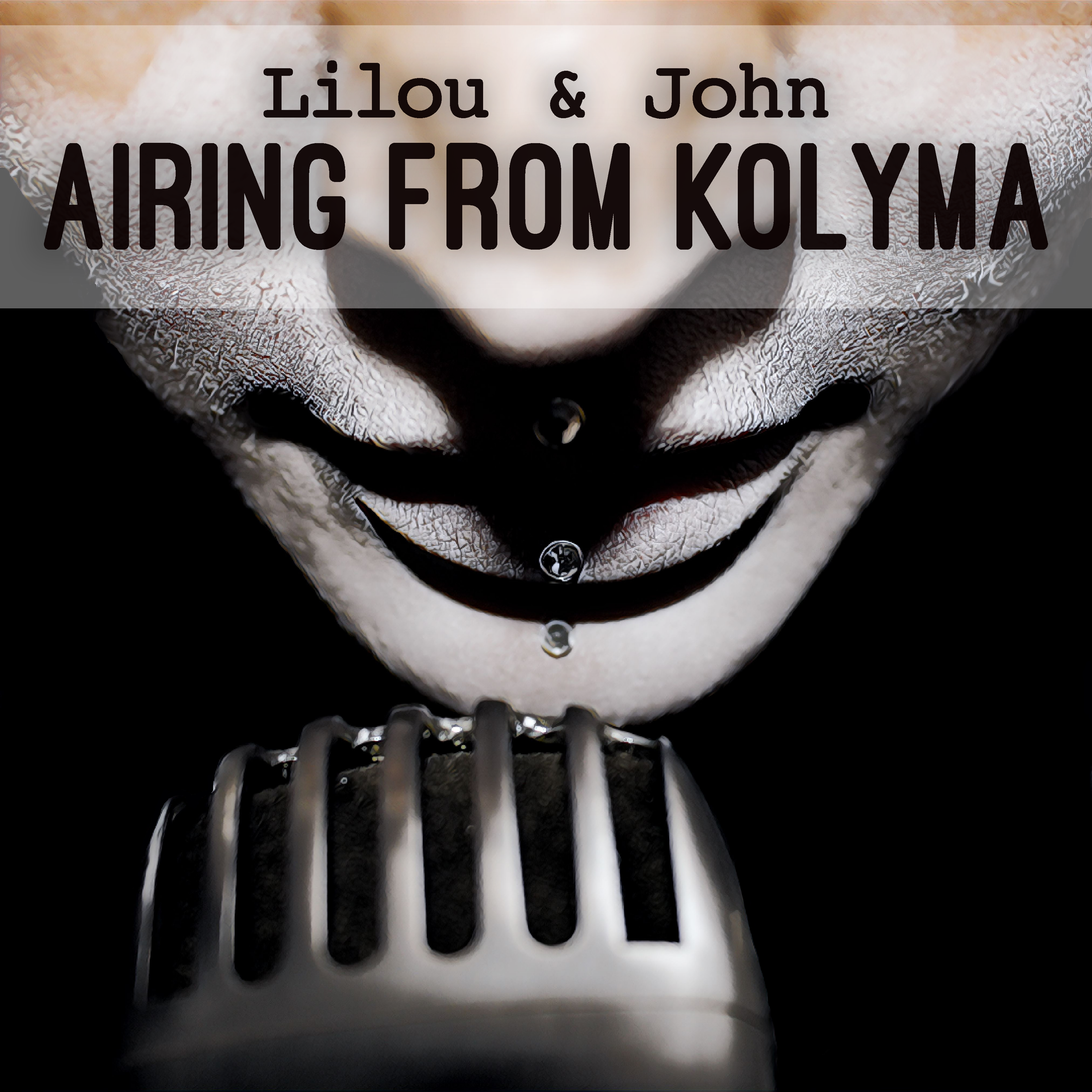
Airing from Kolyma (2018)
After Patriot Child‘s punk fury won acclaim, Lilou and John felt the itch to move on. “The album was great,” they recall, “but we wanted something different.” The raw thrill of screaming and Lemmy-style bass had run its course, and by June 20, 2018, Airing from Kolyma arrived—not as a continuation but a departure. Trading aggression for a broader palette, the EP wove joy, sadness, and hope into its fabric. Free Woman, a minor hit in Hungary, hinted at this shift, its tale of liberty’s echoes rippling beyond the duo’s usual shadows.
The music sidestepped the political labels some tried to pin on it—counter-cultural, yes, but not partisan, as John clarified in a 2020 Europa Report interview. “We tried to convey a message,” he says, “a sense that there’s more than what meets the eye.” Revolutionary Road captures this with its quiet rebellion—”My life is on fire it burns with a flame / I long had forgotten”—while Soft Collision offers a tender ache: “Her arms / His skin / Nothing between.” These are songs of personal horizons, not grand crusades, crafted by two who’d rather reflect than rally.
Yet darkness lingers. Dead Girl Walking mourns a life snuffed out—”Just a girl without a name / Just another ‘woman’ slain”—its starkness a reminder of the duo’s unflinching gaze. By contrast, Alpha Dog roars with road-worn defiance—”We built this land from dust and sand and baby it’s our right”—a nod to individual will over collective dogma. Lilou’s voice, once a punk battering ram, softened here into something versatile, threading hope through despair. The result feels less like a statement than a conversation, intimate and unforced.
For Lilou and John, Airing from Kolyma was no bid for broader appeal—it was a pivot inward, a chance to breathe between storms. Fans heard the shift, some embracing the nuance, others missing the earlier edge. But the duo, ever aloof from expectation, found their footing in this blend of light and shadow. It’s an album that doesn’t demand attention but rewards the attentive— a quiet stand against a world too loud, too certain.
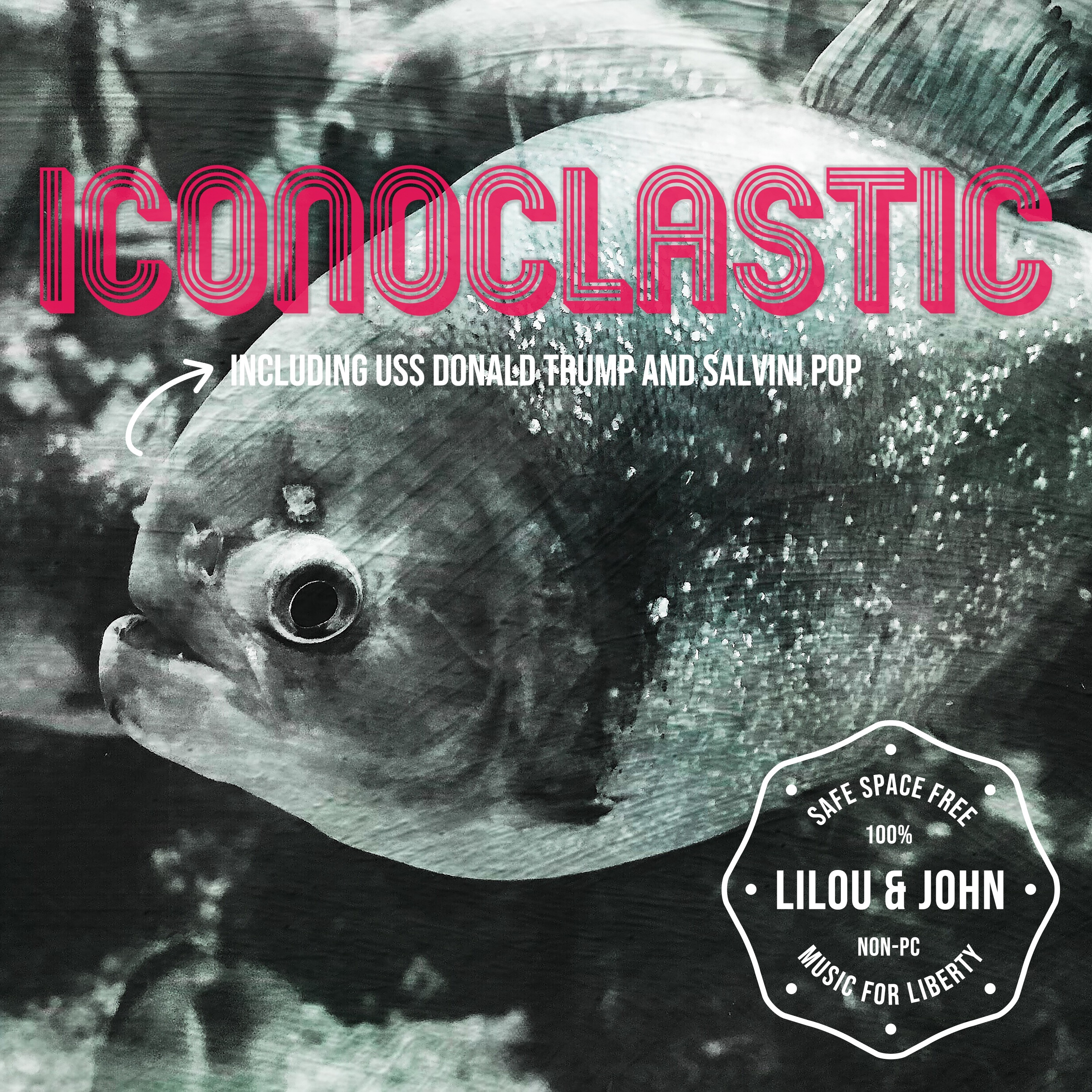
Iconoclastic (2019)
By late 2018, Lilou had grown restless with the familiar growl of guitars, both acoustic and electric, that had defined Airing from Kolyma and Patriot Child. Seeking a fresh pulse, she and John reached out to Nervewar’s Brandon Duncan, an American industrial-metal artist who’d remixed Petrodollar Wars. Their collaboration, meant to spark Iconoclastic, faltered early—too many clashing visions, too little time. “Brandon’s amazing,” John says, “but we didn’t align.” Rather than force it, they parted amicably, taking his advice to forge their own path. Released May 16, 2019, the album—named for Brett Stevens’ nod to Lilou’s “iconoclastic” voice—became their final salvo in aggression before a promised shift.
The leap to EDM wasn’t planned; it was stumbled upon. Armed with Garageband, John found the genre’s beats “fun and easy,” a playground for beginners. “We started all over again,” Lilou recalls, savoring the freedom of home recording—no studio clocks, no pressure, just control. The result is a party album with teeth: Salvini Pop pulses with irreverent swagger, USS Donald Trump churns like a sea beast’s anthem, and Bolsomito stalks with primal rhythm. Tracks like Pasokification and a reimagined Avanti Ragazzi di Buda nod to dissident currents, while The White Eagle honors Polish defiance—each a spark in a growing fire of fans worldwide.
The lyrics bristle with a quiet rebel’s clarity. Counter Jihad rides a steed of iron “until the end of time,” a lone rider’s creed, while Iconoclastic calls sisters to arms—”Rise my sister in Paris / Rise my sister in Rome”—a hymn for the unbowed. Godwin’s Law skewers sanctimony with a snarl: “I am sick of hearing you pretend you’re anti-war / While in fact all what you do is proving Godwin’s Law.” This isn’t polished provocation—it’s raw, unfiltered, and defiantly theirs, a middle finger to a world obsessed with norms.
For Lilou and John, Iconoclastic was liberation through reinvention. No longer tethered to others’ gear or schedules, they seized total command, crafting a sound as restless as their spirits. It’s a bridge between their past and a less abrasive future, a last loud stand that swelled their reach without compromising their core. In its beats, they found not just a new voice but a mirror—two introverts dancing on their own terms, unapologetic and free.
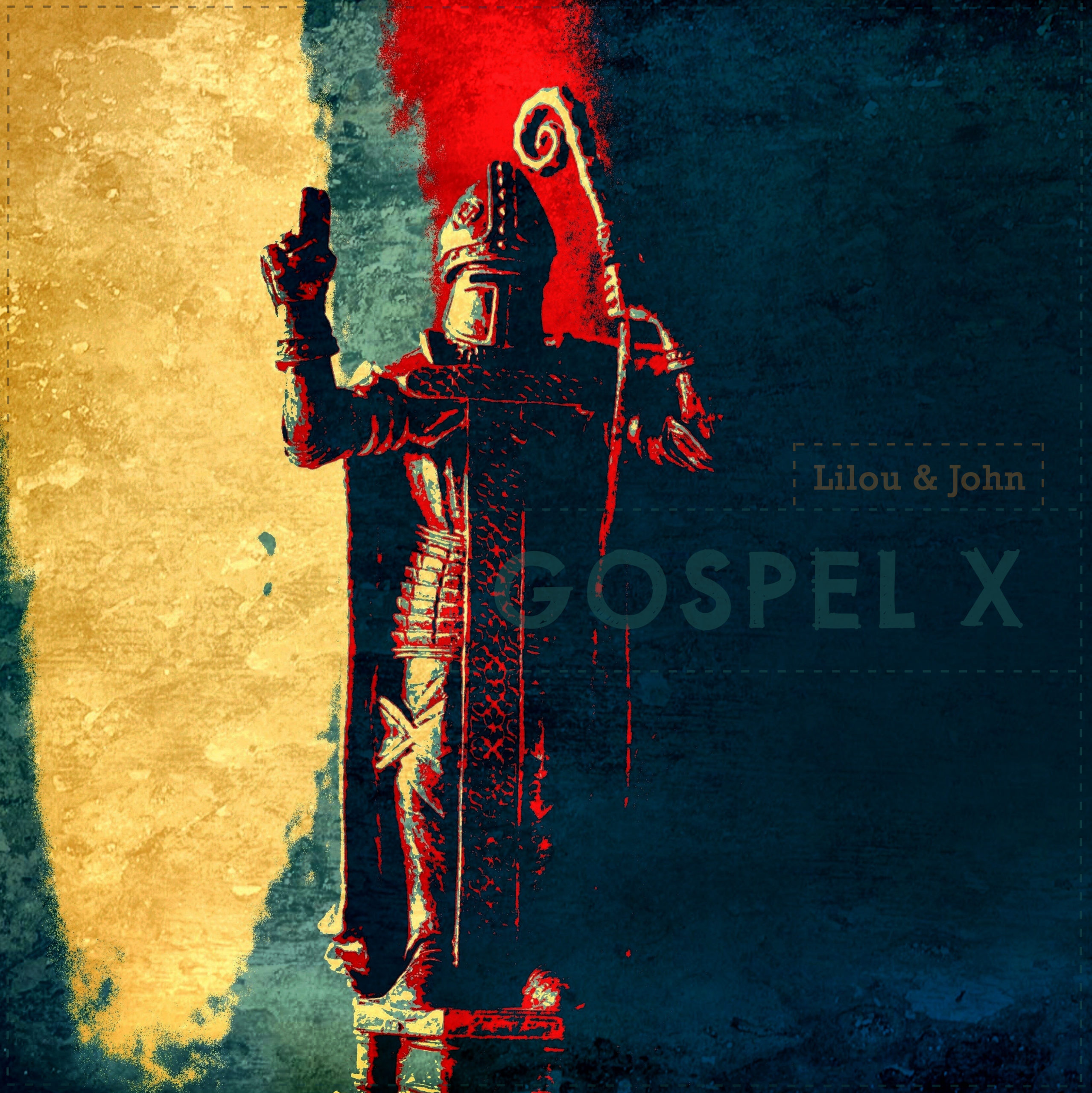
Gospel X (2019)
As 2019 waned, Lilou and John found their music rippling further. Amid this swell, a long-simmering idea—a Christmas single—took shape. A leftover track from Iconoclastic beckoned, and with a tweet proclaiming “Santa isn’t coming this year. The Lord is,” they unveiled Gospel X on Christmas Eve 2020. Stepping back from EDM’s sharp edges, they sought a softer sound, echoing the psychological depth of 100 Faces. “We needed to calm down,” Lilou reflects. “Sometimes we were all dissidents, not artists.”
The shift wasn’t retreat but recalibration. “We were pioneers,” they say, having carved a dissident music scene open to all—a goal met, a torch passed. Gospel X melds roughness and beauty, a new Christmas classic with grit. “It’s energetic, it’s hard,” Lilou notes, its pulse a balm for fans who embraced it instantly. The song sheds social crusades for something inward—a meditation on devotion, not dogma, crafted at their own pace, free of external reins.
John, ever the outsider, frames it through a LaVeyan lens: “It’s the Crusader mentality I respect—700 years of unrelenting will.” Non-Christian yet drawn to its occult echo, he infuses Gospel X with a rider’s zeal—”How far is the ride to Jerusalem / Fly like the bolt of a crossbow”—a lone figure wielding starlight and sword. For two introverts weary of battle cries, this single is a pivot: not a sermon, but a quiet hymn to resilience, sung on their terms.
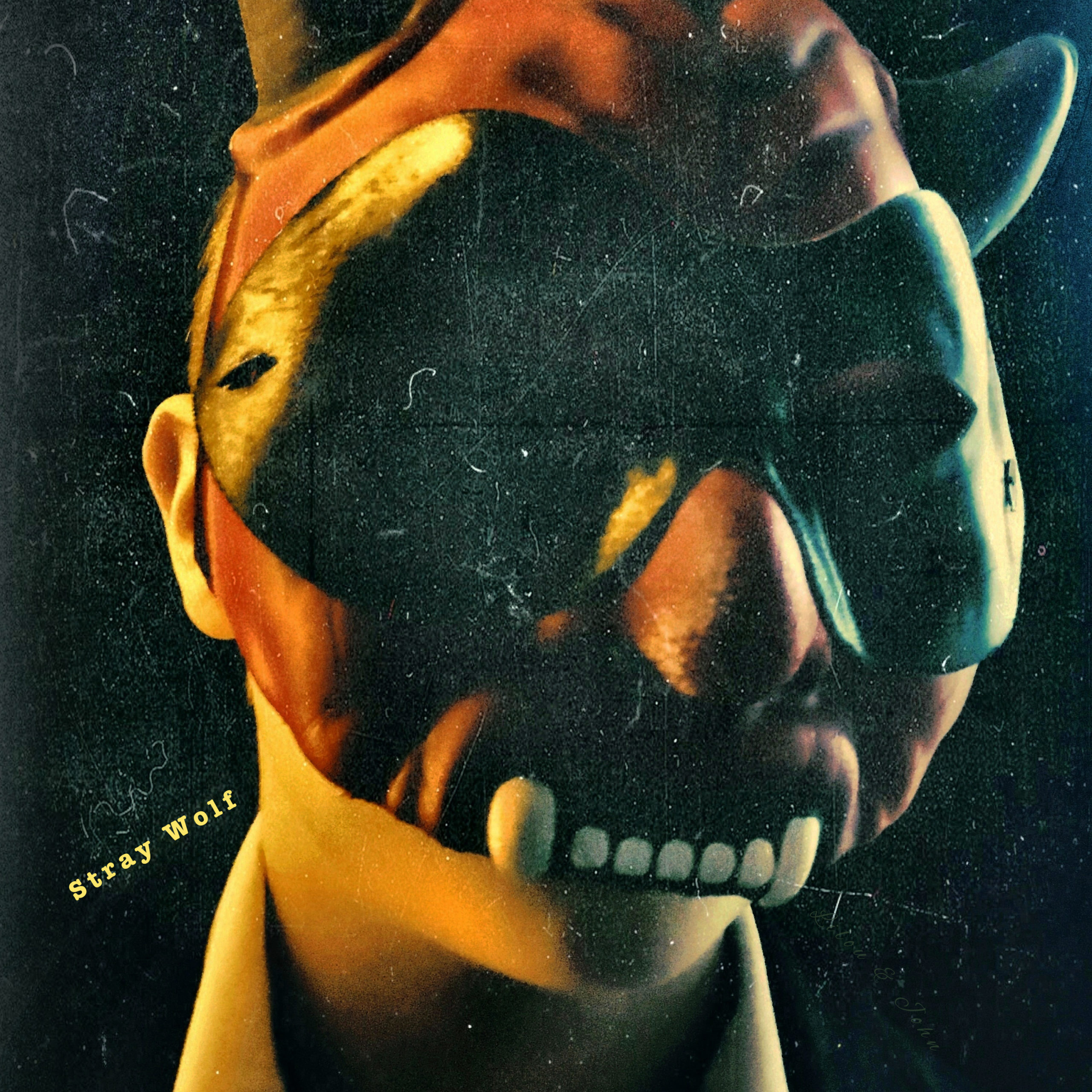
Stray Wolf (2020)
When the Corona wave swept Sweden in 2020, Lilou and John saw not just a virus but a stifling tide—free speech buckling under vaccine debates and fear. From a clutch of half-finished Garageband tracks, they forged Stray Wolf, a two-song single released as their punk farewell. Stray Wolf morphed from a blues lament into a feral anthem of renewal—”Beyond these woods / There is a stray wolf running”—while Corona painted a bleak, poetic vigil: “I stand alone on Joshua Bridge / The rain feels like acid to my skin.” Gaius Nullus’ poetry-cast aired the latter, and Fnordspotting likened it to “neo-folk meets Depeche Mode meets Leonard Cohen”—a fitting epitaph for their activist edge.
This wasn’t politics, they insist, but art unshackled. “We’ve never been a political band,” they say, shedding the dissident label that clung from 2016 to 2019. Songs like Stray Wolf howl for personal exodus, not cultural war, and Corona mourns a world numbed by control, not ideology. Free speech, to them, isn’t a flag to wave—it’s the absence of chains, a principle they’d fought for long enough. “Others can join that work now,” they note, turning inward to music over manifestos.
Stray Wolf closes a chapter with quiet defiance. The punk years—raw, loud, unyielding—fade here, not with a bang but a sigh, as the duo reclaim their artist’s soul. It’s a lone wolf’s stride from the fray, a sound less about confrontation than survival. For Lilou and John, introverts at heart, this single is a pivot back to themselves—unapologetic, free, and finally at peace with letting the world fight its own battles.
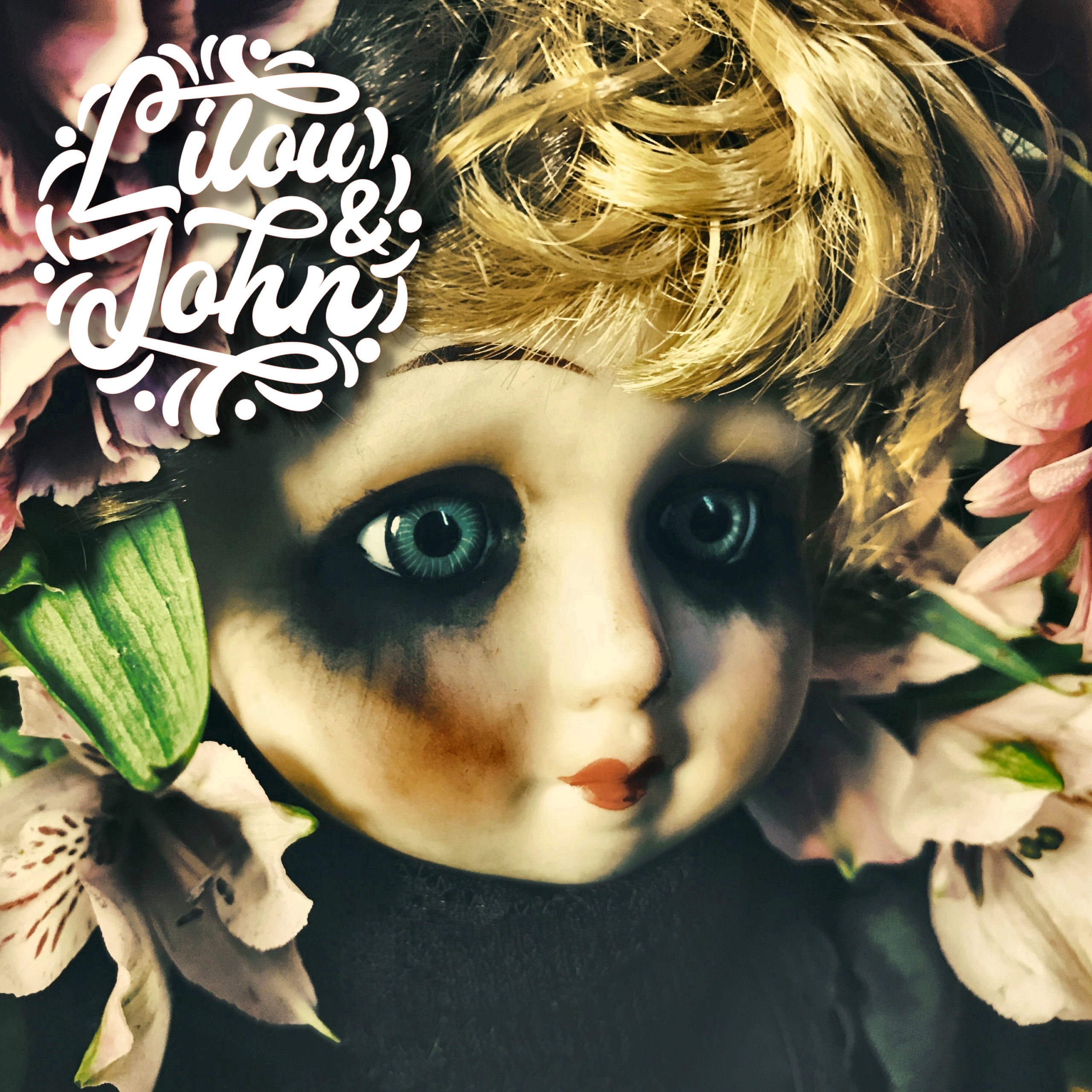
Malaise (2021)
By 2021, after Gospel X and Stray Wolf, Lilou and John stood drained, the spark of music flickering. Years of pushing boundaries had worn them thin; the culture war, once a shadow on their art, felt like a weight they could no longer carry. “It’ll have to be fought without us,” they declared, thanking fans before retreating to recalibrate. From a trove of Garageband tracks, they shaped Malaise—eight songs to clear the decks, a slate wiped clean. “We talked a lot about where we were heading,” John says, balancing Lilou’s restless creativity with his own sharp-edged critique.
The album, released with a doll’s tear-streaked face as its cover, turned inward. “She’s the white woman who ruins her life with wrong choices,” Lilou explains, a symbol of personal wreckage over political noise. Tracks like Serpent Boulevard pulse with dark allure—”My hands bleed from the blood on the floor”—while Gothenburg whispers love’s fragile tether: “You are my way home.” Tequila Metamorphosis dances through a night of fleeting highs, and The Water Sprite mourns a betrayal under moonlight. Hiraeth dubbed it their magnum opus, a nod to its raw, unpolished beauty.
For John, Malaise was a reckoning. “I’m not a man who keeps quiet,” he admits, his online clashes with activists—over hubris and hypocrisy—widening rifts with fans, even as White Art Collective’s Jeff Winston spun the album to a growing U.S. crowd. “It’s hard for people to see you must dig into what’s broken to rebuild,” he reflects. The title track—”I am a glitch on a screen / And I’m breaking free”—captures this: a soul clawing out of numbness. Lilou, too, felt the shift incomplete, a step toward healing but not yet home.
This wasn’t the duo’s endgame, just a purge of old ghosts. Free of the dissident mantle, they shed the need to provoke, focusing instead on their U.S. reach, yet John’s clashes—calling out collectivism or cowardice—strained ties with some. Malaise is exhaustion and renewal entwined—less a battle cry than a quiet unraveling, played to fans who stayed through every turn. For Lilou and John, introverts at their core, it’s a ledger closed, a wound probed, a breath before the next unknown.
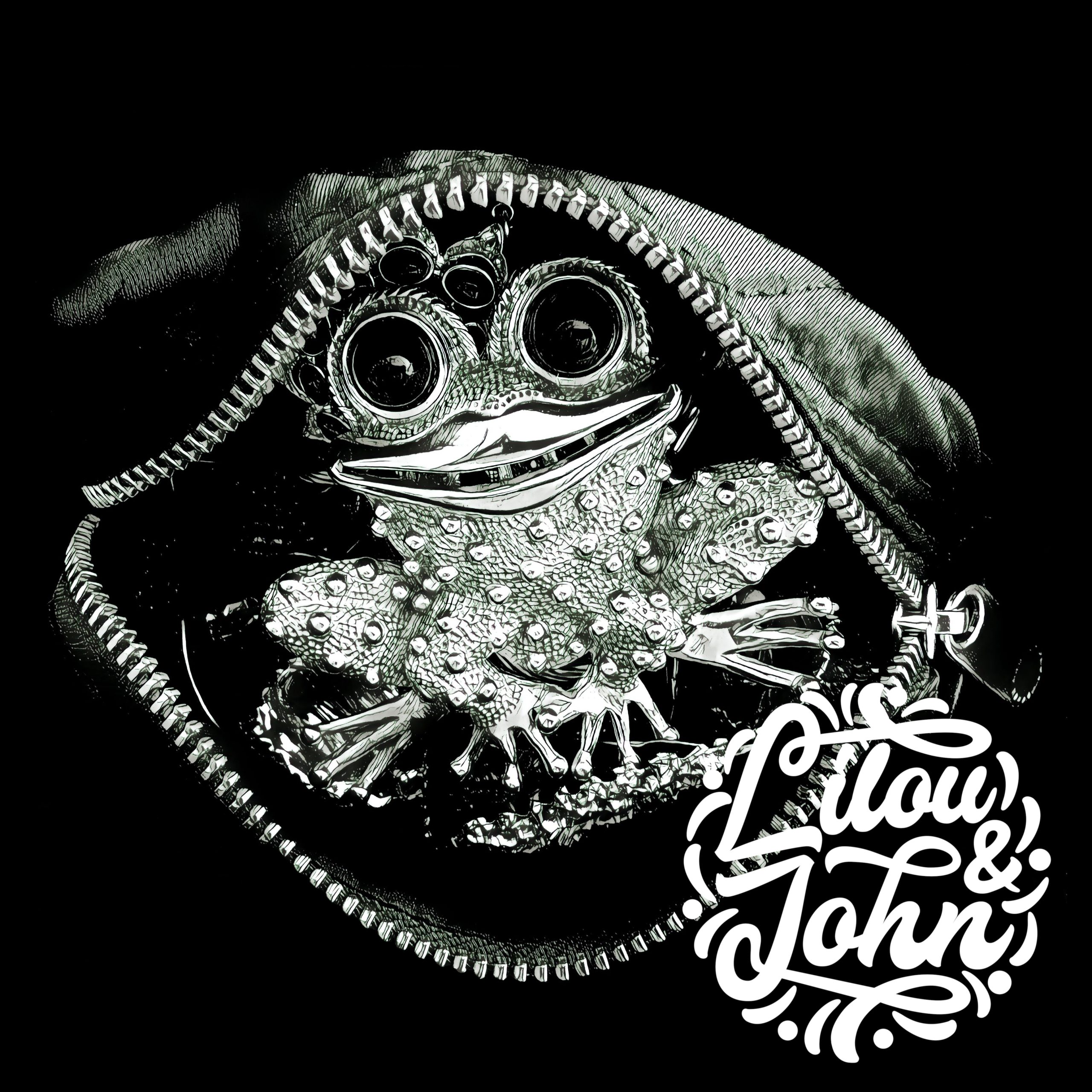
Midnight Oracle (2023)
After Malaise, Lilou and John drifted from the spotlight, their punk days a fading echo. Life intervened—a move to a new flat, experiments in indoor farming, a recession nudging them further down a vegetarian path begun years prior. “There was too much to do,” Lilou recalls, the duo’s energy sapped by survival over songcraft. Music sites and podcasts grew distant, and their project hit a quiet nadir. It wasn’t until summer 2023 that Midnight Oracle emerged, born from old Garageband tracks reshaped into something new—a frog medallion peering from a handbag, a symbol of peering into the unseen.
The album’s title, a compromise after scrapping Royal Garden, hints at its esoteric turn. “I’m deeply into the esoteric and occult,” John says, pointing to Black Mass—a track simmering since their early days, its lyrics channeling Gustave Le Bon’s crowd psychology. Lilou aimed to echo 100 Faces’ introspective roots while clearing their backlog for a fresh start. “It’s a mental abyss,” she notes—trauma, death, and spiritual war loom large in Opium Den‘s plea—”Hush little Raven don’t fall asleep”—and Gomorrah‘s desolate drive: “Just the echo of a gun / Ringing out into a night in hell.”
This isn’t the brash dissidence of old but a quieter unraveling. The Leper House mourns a lost girl—”You died alone / Forever weeping beside your withering bones”—while Las Vegas paints a city’s collapse: “I am alone again / In a black hole where the ash of people glow.” John’s cape-buffalo bluntness finds a softer edge here, tempered by Lilou’s creative drift.
Midnight Oracle is a bridge and a burial—old tracks laid to rest, a band reborn in shadow. Fans lauded Malaise, but this feels less like a plea for ears than a private exorcism, its quality undimmed by their retreat. For Lilou and John, introverts navigating chaos, it’s a midnight reckoning—less about the world’s noise than their own depths.
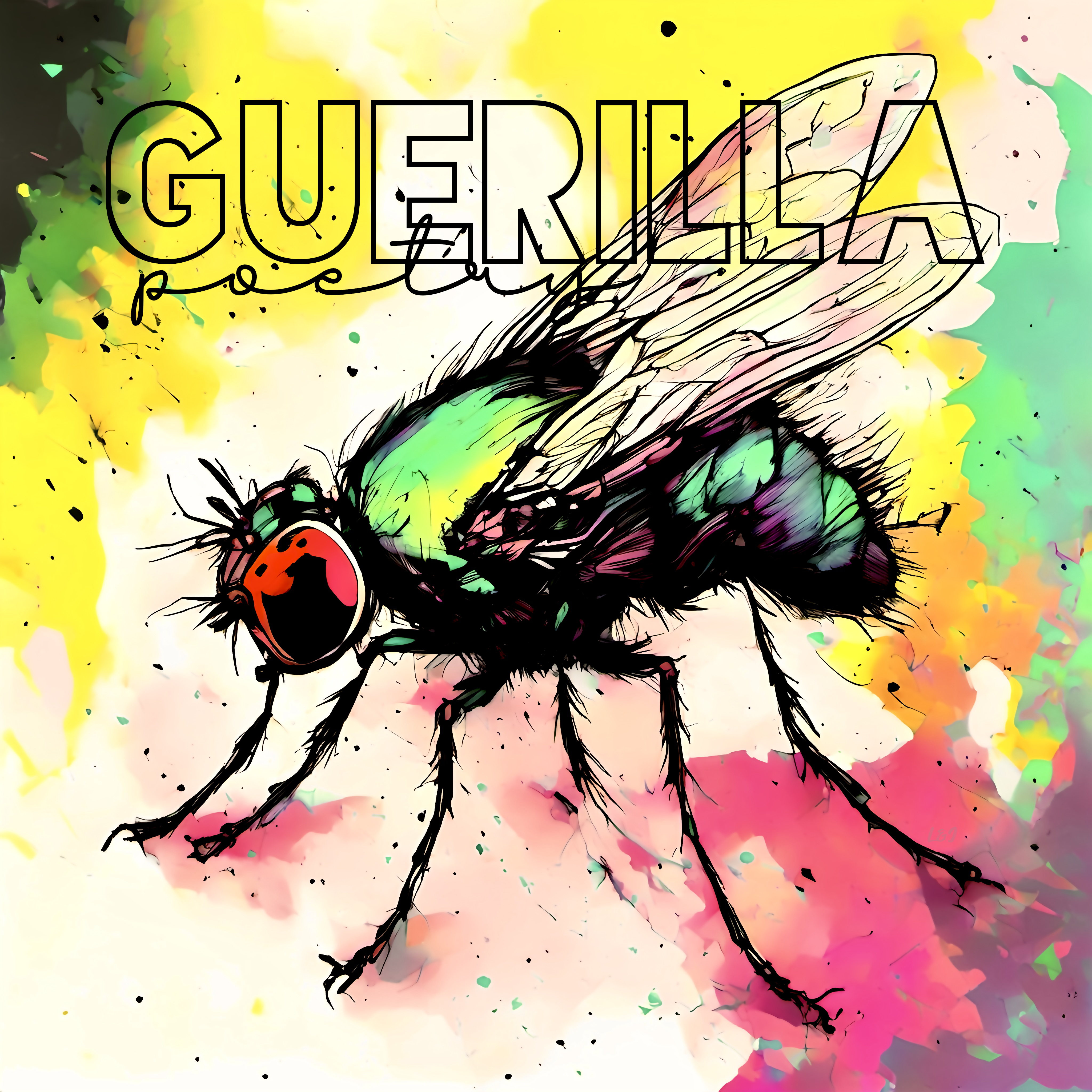
Guerilla Poetry (2024)
Guerilla Poetry arrived as a prophecy fulfilled—a sprawling, 12-track dirge for a lost world, a jagged promise of what could be. Released after Midnight Oracle, it was the duo’s most unfiltered plunge yet, a gritty howl from two freedom-loving introverts who’d tired of polish. “It’s a Nietzschean stand against collectivism,” John says, “raw, experimental, off-grid.” Recorded with no rehearsal, balcony door shut against the neighbor’s mower, it’s the sound they chased since 100 Faces—unrestrained, authentic. “You learn perfection first,” John notes, “then choose the rawness.”
Lilou echoes this: “It was what we always wanted—creative, free, no cleaning the tracks.” The 19th-century “guerilla” spelling, shunning the chic double-r, roots it in a rugged past, a jab at metrosexual sheen. Songs like Nineveh blaze with apocalyptic fury—”A thousand stars are dying / Cursed by the word of a liar”—while Kingly Infant pleads for recognition: “If only you could see me.” Dead Puppy Song mourns a truer heart—”There ain’t no lying in a dog’s eye”—and Guerilla Lullaby cradles a tender hope: “Sleep my little ray of light.” It’s personal beyond measure, a mind’s abyss laid bare.
Post-release, Lilou and John shuttered most social media, weary of the clamor and John’s own bristling candor. “I can’t spend my life angry at propagandists,” he admits, stepping back from fan friction to refocus. Marketing was scant—an article on its creative ethos, a whisper of its arrival. “We came out of nowhere, inspired people,” John reflects, likening it to Avanti Ragazzi di Buda’s mountain-bound vow. Guerilla Poetry wasn’t for the masses; it’s a banshee’s cry for the few who heard, a slate not wiped but shattered.
This was no swan song—just a pivot. The duo, back with a bite, teased more to come, forged in solitude. Guerilla Poetry was their soul stripped raw—grit over gloss, freedom over fetters. For Lilou and John, it was homecoming and rebellion entwined, a testament to learning the craft only to break it. They’d returned from the mountains, not with spring’s bloom but a winter’s edge, promising a future as untamed as their past.
-
 Lilou & John
Lilou & John -
 Bio
Bio -
 Album
Album -
 Album
Album -
 Single
Single -
 Single
Single -
 Album
Album -
 Novel
Novel -
 Album
Album